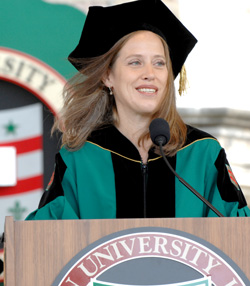Inexperience and time give recent college graduates an advantage in solving the problems of inequity in education in the United States, said Wendy Kopp to the Class of 2009 during the 148th Commencement ceremony May 15.
“This is a solvable problem,” said Kopp, the founder and chief executive officer of Teach For America — a national corps of outstanding college graduates who commit to teach for at least two years in some of the country’s highest-need schools.

Since 1990, more than 20,000 individuals have participated in Teach For America, impacting the lives of approximately 3 million students. Teach For America has provided more teachers for low-income communities than any other organization.
Kopp addressed the crowd of more than 15,000 during the ceremony in Brookings Quadrangle, saying so many Teach For America alumni remain in education because “we’ve seen the magnitude of the problem and the consequences of it, yes, but mostly because we’ve learned that it doesn’t need to exist.”
Recent graduates may be tempted to assume that they will “address the world’s problems later — after you have families or make millions or gain skills and experience,” she told the approximately 2,600 students gathered before her.
However, “there is something about the fresh perspective, the naivete, the limitless energy that comes along with youth and inexperience that enables recent graduates to solve problems that many more experienced people have given up on,” Kopp said.
In addition, Kopp said, solving the world’s problems, while possible, takes time — a resource many graduates possess.
Kopp said that it is easy for those who are fortunate enough to have received excellent educations and the opportunities that result to isolate themselves from the inequities that persist in our world. However, “we cannot let this happen because of their magnitude and the consequence for individuals and communities and society and all of us, and especially because of the evidence that these are solvable problems,” Kopp said.
“Because if we can solve them, we must,” she said.
“If educational inequity, or poverty, is solvable, it is the moral responsibility of those of us who have been given so much to do everything in our power to realize that change,” she said.
Kopp, who received an honorary doctor of humanities degree during the ceremony, began her remarks by noting WUSTL’s important role in producing inspiring and impactful Teach For America corps members, leaders and alumni.
“I think there’s something in the water here, no doubt thanks to your own intentional practice, and I hope that the faculty and administration can reflect this morning on the difference you are making through your work,” Kopp said.
She also congratulated graduating students and families, taking special note of the 25 graduating WUSTL students who will join Teach For America in 2009.
Kopp then discussed how and why she formed Teach For America nearly 20 years ago after proposing the idea of Teach For America in her thesis at Princeton University.
Kopp says that she believed “the inequity in educational outcomes that persisted along socioeconomic and racial lines in our country was among our greatest injustices, that the leaders in our generation were searching for something they weren’t finding and would jump at the chance to teach in urban and rural public schools, that our energy and idealism would make a difference in the lives of the nation’s most disadvantaged kids.”
However, Kopp said, when she proposed in her thesis that she create a teacher corps, her thesis adviser pronounced her “deranged.” But aided by her inexperience and with time on her side, Kopp — along with the thousands of teachers who have joined Teach For America — has made a difference in the lives of schoolchildren throughout the country.
Kopp cited many examples of teachers who are WUSTL alumni or from the St. Louis area and the improvements they have made in public schools throughout the country — including Ed Chang, a 1997 graduate, and Glenn Davis, a 2003 graduate, who are both starting their own schools in Atlanta and Gary, Ind., respec-tively.
Kopp mentioned a conversation she had with Davis, in which she asked if he had thought, when graduating in 2003, that he would be starting a high school six years later.
“He laughed as if it would be entirely inconceivable,” Kopp said. “But thank heavens that he dove in early because now he’s going to have years and years to change what’s possible for kids in Gary, Indiana, and maybe beyond.”
In the two decades since she founded Teach For America, Kopp said it is true that the achievement gap has not been narrowed in an aggregate sense.
“And, yet, things are so very different today,” she said. “The question we’re asking has changed. It is no longer ‘Can we do this?’ but rather now it is ‘Can we do this at scale?’
“And even to that question, some communities are giving us real evidence of the possibility of system-wide change. From Washington, D.C., to New Orleans to New York City, school systems are closing achievement gaps in significant, measurable ways,” she said.
“If you go to these communities, it is impossible to miss the fact that a big part of what is moving the needle is a bunch of talented, committed teachers, school leaders, district administrators and community leaders who learned through their experiences teaching in Teach For America that it is possible to solve this problem and what it will take to solve it,” she said.
Kopp ended her address with a challenge to the graduates to reflect on the disparities in the world and the enormous assets they possess to help solve them.
She wished the WUSTL graduates the same good fortune she had found in her career.
“I have spent not one minute of my last 20 years searching for what I really wanted to be doing because I happened into something that, while exhausting and challenging, is unbelievably fulfilling,” she said.